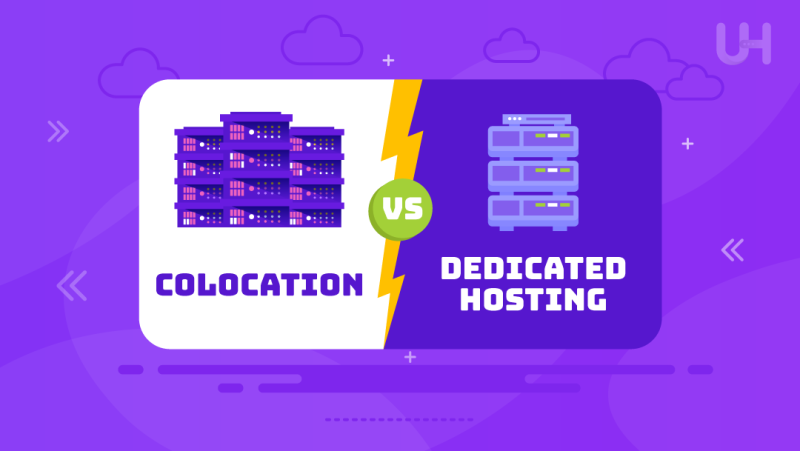Several business organizations moved their hosted infrastructure from on-premise facilities into data center facilities in 2020 in businesses working remotely from homes to save particular money or shift resources towards providing support for these remote works or whatsoever. The two well-known solutions to this migration are Colocation vs Dedicated Hosting.
In this article, we will present a comparative analysis examining the principal differences between colocation vs dedicated servers. We’ll highlight the pros and cons of both options in detail so that you can make your decision more quickly.
Key Takeaways
- Both options provide excellent security and reliability, but colocation allows for custom security protocols, while dedicated hosting relies on the provider’s measures.
- Colocation involves a business owning its server hardware and renting space in a third-party data center, while dedicated hosting is leasing a server from a provider.
- With colocation, the customer maintains full control over their hardware and software, whereas with dedicated hosting, the provider manages the server maintenance and updates.
- Colocation has a high initial cost due to the purchase of hardware, but lower recurring fees; dedicated hosting has lower upfront costs but higher monthly fees.
- Dedicated hosting offers convenient 24/7 support and is a good option for businesses without an in-house IT team.
Understanding Colocation?
Colocation is an approach to managing IT infrastructure. An organization places its server hardware and other equipment in a third-party data center with this approach. In this setup, the colocation provider supplies The physical space, power, data center cooling, and network connectivity. The organization maintains complete ownership and control over its hardware.
Colocation allows organizations to use the advantages of professional-grade data centers’better infrastructure. Without investing in a private facility, they can also enjoy improved security. Finally, it will enable enterprises to ensure high availability and scalability for their crucial applications while maintaining total control over the IT environment.
Advantages of Colocation
- Choose Your Hardware: Colocation allows you to select the hardware that meets your specific needs, reducing the chance of inadequate performance.
- Own Your Hardware: With colocation, you can own your infrastructure, whether through leasing or outright purchase, avoiding ongoing rental costs associated with the dedicated server.
- Control Your Cost: Colocation enables you to manage expenses by eliminating the maintenance costs of dedicated hosting, allowing you to take responsibility for your servers.
Disadvantages of Colocation
- Manage Your Hardware: A downside of colocation server hosting is the need for on-site management in case of hardware failure. This may involve unexpected travel, and keeping spare components on hand can be necessary if your hardware has a short life cycle.
- Manage Your Software: With dedicated server colocation, you’re responsible for managing the software, often remotely. Timely updates and patches are crucial; otherwise, software management could incur additional costs if there’s no in-house development team.
Understanding Dedicated Hosting

In this single-tenant environment, a dedicated server has hardware and resources allotted to a single end user. There are several types, some popular of which are Bare Metal servers and Managed Dedicated Server Hosting.
With managed dedicated server hosting, the provider is supposed to configure, administer, manage, and support the server, operating system, and software. In other words, the goal is to have only your data in your environment and protect it from DDoS attacks.
Advantages of Dedicated Hosting
When weighing Colocation vs Dedicated Hosting, there are many more advantages on the Dedicated Server Hosting side.
- Hardware Support: In a dedicated server, the support comes from the hosting company. That is, there is no need for trips to maintain it and not to care about spare components.
- Server Software Support: Many reliable hosting services provide server software support, which can be cost-effective and time-saving, depending on the provider.
- 24/7 Support: Most dedicated server data centers will have around-the-clock support. This, therefore, shifts the late-night maintenance for smooth operations and saves time and money compared to colocation.
Disadvantages of Dedicated Server Hosting
- Higher Long-Term Cost: Dedicated Server Hosting tends to have a higher long-term cost, which should be considered despite value-added features.
- Fewer Customization Options: While some providers offer customization, others may not, limiting options for specific components like GPUs or certain drives essential for enterprise needs.
If your requirements call for a specific setup your provider does not offer, you may need to compromise.
Key Differences: Colocation vs Dedicated Hosting
| Feature | Colocation Hosting | Dedicated Hosting |
| Hardware Ownership | Owned by the customer | Owned by the hosting provider |
| Maintenance | Handled by the customer | Managed by the provider |
| Upfront Costs | High (purchase of servers) | Low (no hardware purchase) |
| Recurring Costs | Lower | Higher (monthly fees) |
| Control | Full control over hardware | Limited to provider’s options |
| Scalability | Hardware upgrades required | Flexible and provider-supported |
| Location | Fixed at the data center | Managed remotely by the provider |
Choosing Between Dedicated Server vs Colocation
Selecting the optimal solution for your business hinges on its specific needs and objectives. Here are a few scenarios to contemplate:
When to Choose Colocation?
If you’ve invested a lot into your hardware and are seeking a secure place to house it, then colocation might just be what you are looking for. In colocation services, the specifications of your server are entirely in your control-which means you can have it configured as you’d like. While colocation might be pretty costly initially, it can be relatively cost-effective over a long period since, most of the time, one doesn’t have to bear all the maintenance and operational costs of running your data center. You choose colocation to safely house your hardware in a facility that has superior security measures, infrastructure, power, and cooling.
When to Choose Dedicated Hosting?
The underlying notion here is that dedicated hosting makes life much easier for businesses because there will not be any complicated problems involving the management of hardware. By availing yourself of a dedicated hosting service, technical support is automatically catered to by your service provider, which comes in handy when the organization lacks the support of an IT department as well. This means, that while this type of hosting keeps your server maintained with expert attention, you upscale the resources at your ease without having to worry about what might go wrong with that scaling. This will enable you to increase your server capabilities as your business grows and demands increase without having to invest in more hardware, hence enabling you to manage your resources more effectively.
Ready to make the right choice for your business?
Don’t guess which hosting solution is best for your unique needs. Whether you need full control of your hardware with colocation or a hassle-free, Ultahost’s fully managed dedicated server, we have the perfect solution.
Cost Comparison: Colocation vs Dedicated Hosting
Here is a quick overview of the cost comparison between Colocation and Dedicated Hosting:
Colocation Hosting Costs
- Initial Costs: Purchase of servers and hardware.
- Recurring Costs: Monthly colocation fees for rack space, power, and bandwidth.
- Maintenance Costs: Repairs and hardware upgrades are your responsibility.
Dedicated Hosting Costs
- Initial Costs: Minimal to none, as the provider supplies the hardware.
- Recurring Costs: Monthly fees for server rental and management.
- Maintenance Costs: Included in the monthly fees.
For businesses with substantial initial budgets for web hosting and technical expertise, colocation can provide long-term savings. However, dedicated hosting is a more suitable option for those looking for convenience and managed services.
Security: Colocation vs Dedicated Hosting
When considering hosting solutions, it’s essential to understand the security measures they offer, as there are distinct differences between colocation hosting and dedicated hosting.
Colocation hosting provides physical security features, including biometric access controls and surveillance systems, ensuring that the physical server environment is well-protected. However, it’s important to note that network security in colocation hosting is typically the responsibility of the client.
In contrast, dedicated hosting often comes with a variety of advanced security features provided by the host, such as firewalls, data privacy and data security. Many dedicated hosting services also offer fully secure VPS hosting solutions, relieving clients of some security management responsibilities.
For businesses that prioritize control over their security protocols, colocation hosting may be the more suitable option. Conversely, dedicated hosting is particularly advantageous for those who prefer the convenience of having security managed by the service provider.
Scalability and Flexibility
Colocation Hosting requires purchasing additional hardware for scaling, which is ideal for businesses with predictable growth and hardware needs. Colocation Hosting involves acquiring additional hardware to scale operations, making it particularly suitable for companies that experience predictable growth and have consistent hardware requirements.
On the other hand, Dedicated Hosting providers facilitate seamless resource upgrades, which is advantageous for businesses that face fluctuating demands and need flexibility in their hosting solutions.
Reliability and Performance
Colocation and dedicated hosting both boast very reliable forms of hosting environments. The performance in colocation, however, largely depends on the quality of the hardware you use because you are managing your equipment. In the case of dedicated hosting, however, it will depend on how good the infrastructure and facilities are that the hosting provider is selling to you. Taking these differences into consideration, you’re already halfway toward informed decision-making based on personal needs.
Environmental Impact
Dedicated hosting providers frequently utilize green data centers, which contribute to a more environmentally friendly option for hosting services. Additionally, colocation allows businesses to select eco-friendly hardware, giving them greater control over their environmental impact and helping to reduce their overall carbon footprint.
Conclusion
Choosing between colocation vs dedicated hosting depends on your business needs, budget, and technical expertise. If you value control and already own hardware, colocation is a compelling choice. However, if you prefer a hassle-free, managed solution, dedicated hosting is the way to go.
Evaluate your priorities and future growth plans to select the hosting solution that aligns with your goals. For Colocation hosting solutions, explore UltaHost’s Offshore server hosting the perfect fit for your business.
FAQ
What is the main difference between colocation and dedicated hosting?
The key difference lies in hardware ownership. Colocation requires you to own and maintain your servers, while dedicated hosting provides provider-owned hardware managed on your behalf.
Is colocation more secure than dedicated hosting?
Both offer robust security, but colocation allows you to implement custom measures, while dedicated hosting relies on the provider’s security features.
Which option is more cost-effective?
Colocation can be cost-effective over the long term, while dedicated hosting is better for those seeking lower upfront costs.
Can I upgrade my resources easily with colocation?
Upgrading in colocation requires purchasing and installing additional hardware, whereas dedicated hosting offers seamless scalability through the provider.
Do I need technical expertise for colocation?
Yes, managing and maintaining your servers requires IT expertise. Dedicated hosting, on the other hand, is fully managed by the provider.
Which is better for small businesses: colocation or dedicated hosting?
Small businesses typically benefit more from dedicated hosting due to its managed services and lower upfront costs.
Can I switch from colocation to dedicated hosting later?
Yes, many hosting providers offer migration services to help you transition from colocation to dedicated hosting.








